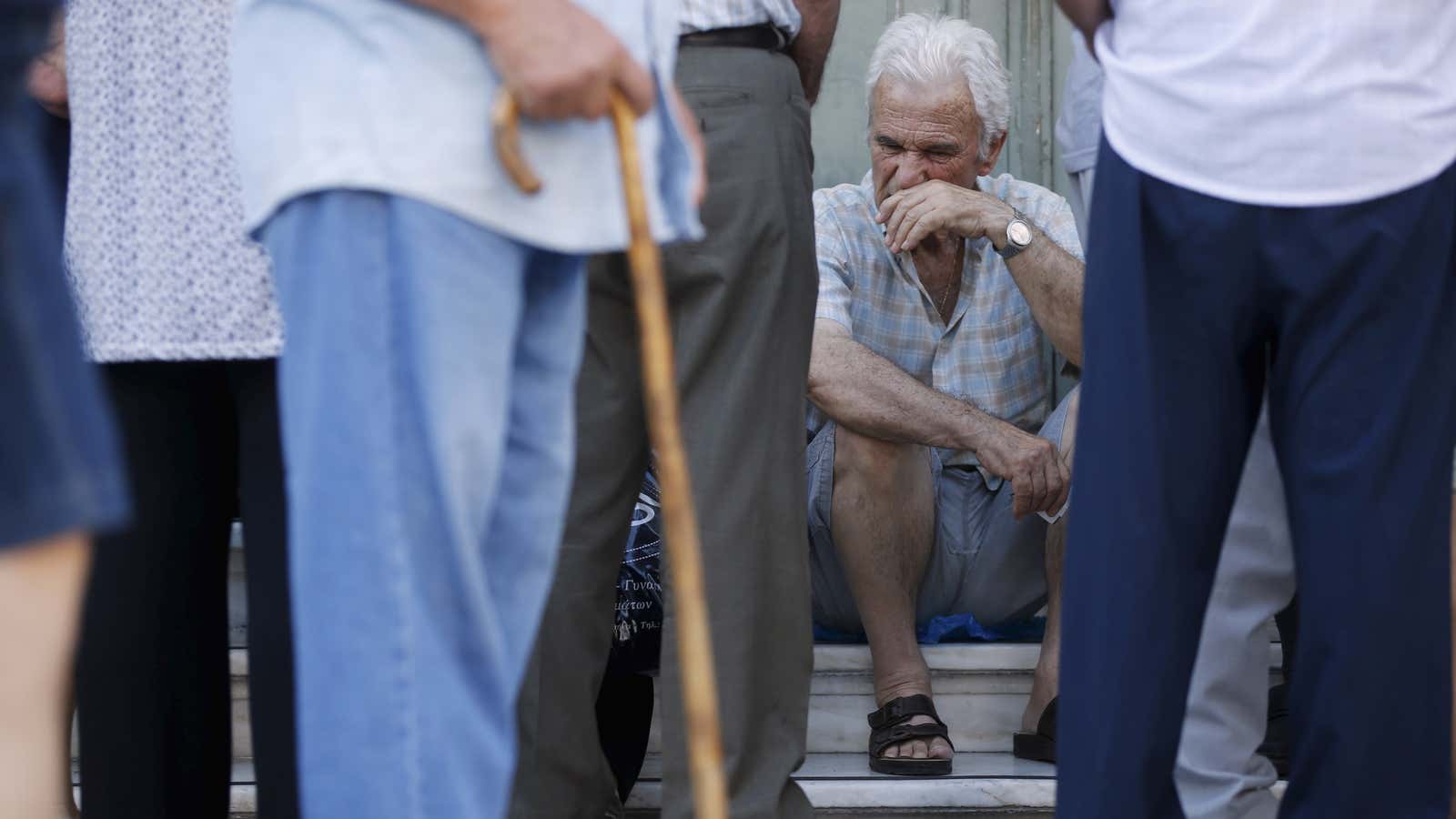It’s a pretty upsetting image: an elderly man, slumped against a wall in the Greek city of Thessaloniki, weeping. Taken by AFP photographer Sakis Mitrolidis last week, as thousands of Greeks queued outside of cash-strapped banks, many of which turned away pensioners whose monthly allowances seemed to disappear without explanation. The photo has been widely shared on social media—touching on a major concern regarding Greece’s uncertain economic future: what will happen to pensioners?
Crying pensioner Giorgos Chatzifotiadis sums up #Greece tragedy. Backstory to @AFP photos http://t.co/CW3X5uBzJK pic.twitter.com/XB8GcJTamf
— Jon Williams (@WilliamsJon) July 4, 2015
Greece is home to one of the most “aged” populations in Europe. A report compiled by UN demographers predict that trend isn’t likely to change anytime soon; by 2050, 40.7% of Greece’s population is expected to be 60 and older.
Obviously, this raises concerns over prospects of a healthy, able workforce for Greece. But at present, following the country’s rejection of terms for an international bailout, a more urgent issue is how Greece’s elderly will fair in such a tumultuous financial climate.
Ahead of Sunday’s referendum, prime minister Alexis Tsipras vowed to deny any further cuts to Greece’s pension system, something creditors have said might be necessary for Greece to repay its debts. But monthly pensions have already shrunk to an average of €833 from an average of €1,350 in 2009, according to the Greek Labor Institute (INE-GSEE), the organization behind Greece’s largest union.
On top of the sharp decline in monthly allocations, when Greece closed its banks for the week leading up to the referendum, they capped ATM withdrawals at €60 a day. Considering many pensioners don’t use bank cards, opting to transact with checks and in-person bank visits, a number had no viable means of feeding themselves, paying power bills, or affording any other necessary expenditures. Some banks reopened midweek to specifically remedy this problem, offering pensioners an upped maximum of €120 per day in withdrawals.
Despite the rhetoric surrounding Greece’s supposedly overly indulgent pension system, Greece’s pension plan isn’t as generous as most believe. A report compiled by The Wall Street Journal’s Matthew Dalton found that, when adjusting data for demographic makeup and looking at pension spending as a percentage of GDP, Greece actually spends less on citizens over the age of 65 than Luxembourg, Austria, the Netherlands, France, Finland, Belgium, Ireland, Italy, or Germany. It also spends less than the Eurozone average.
It shouldn’t be surprising that 45% of Greek pensioners receive monthly payments below the national poverty line. And yet, it is. Ultimately, it’s a phenomena that comes full circle—Greece’s pensioners aren’t getting much in way of pensions because the deceptive amount allocated for them is spread over one of Europe’s largest elderly populations.
Retired Greeks are arguably less able to take their economic futures into their own hands; they aren’t as able to take advantage of provisions like the Schengen Agreement, which younger, spryer Greeks might use of to seek employment in more economically stable European states.
As with most cases of economic turbulence and social disorder, the loudest voices calling for change tend to be those of the young. The faces featured in many wire-service photos of the Greek crisis are unlined by age. They’re angry, and have every right to be—but in the case of Greece, it might be the old that bare the severest brunt of a crumbling economy.
